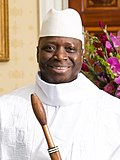Conduct
The elections were monitored by the African Union who praised the process, [5] European Union, Organisation of Islamic Cooperation and Commonwealth. [4] The Economic Community of West African States (ECOWAS) did not send any monitors because of "an unacceptable level of control of the electronic media by the party in power... and an opposition and electorate cowed by repression and intimidation". [4]
Before the elections Jammeh had claimed "I will never compromise peace and stability at the altar of so-called democracy", [6] that "there is no way I can lose unless you tell me that all Gambian people are mad" and in response to press criticism said "The journalists are less than 1% of the population and if anybody expects me to allow less than 1% of the population to destroy 99% of the population, you are in the wrong place." [7]
On the election day Bah claimed that he had not heard of any intimidation of his supporters [8] although Darboe claimed the vote was fraudulent, rejected the result [7] [9] [10] and complained of intimidation from the presence of military vehicles on the streets. [11] The Independent Electoral Commission also said there was no intimidation [12] and that "it is impossible to rig elections in Gambia". [8]
There was also criticism of the election organisation as many voters went to the wrong polling station. [4]
This page is based on this
Wikipedia article Text is available under the
CC BY-SA 4.0 license; additional terms may apply.
Images, videos and audio are available under their respective licenses.




